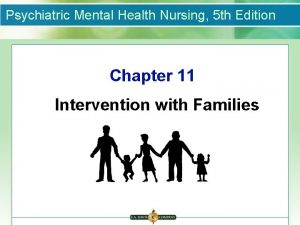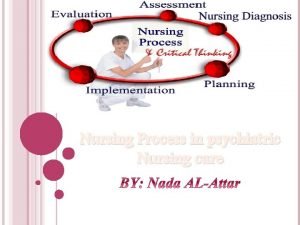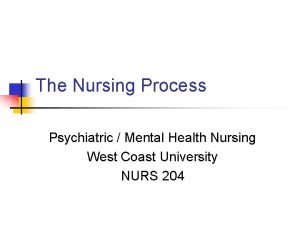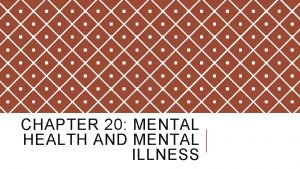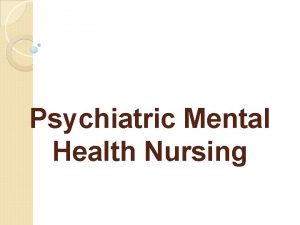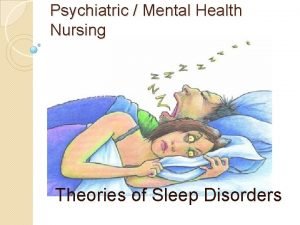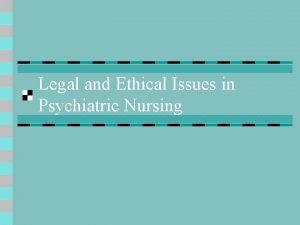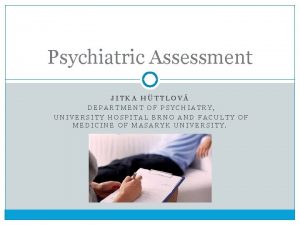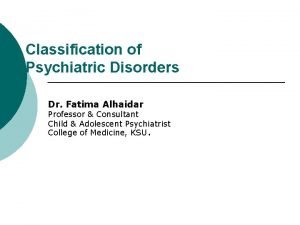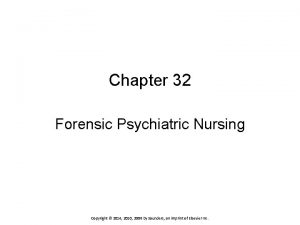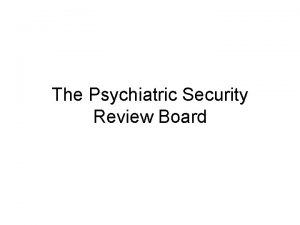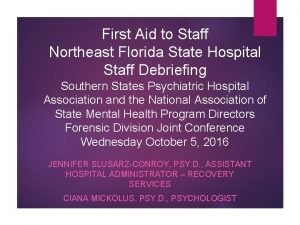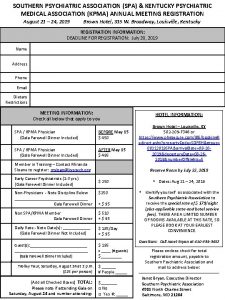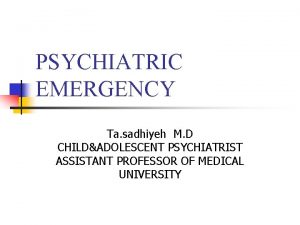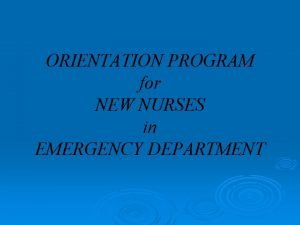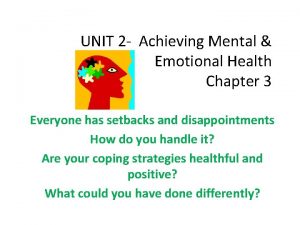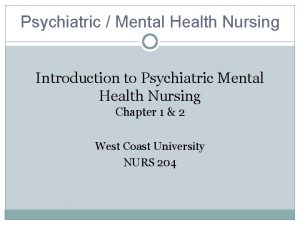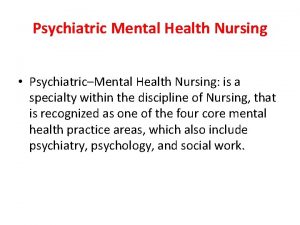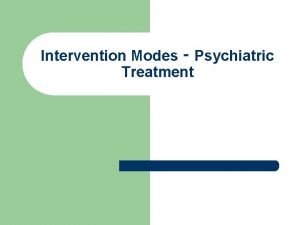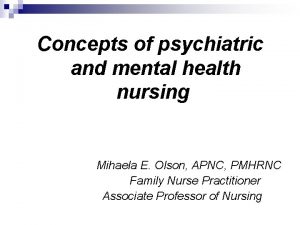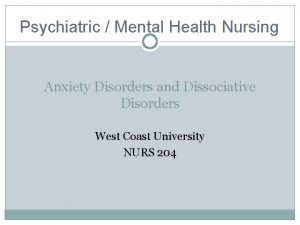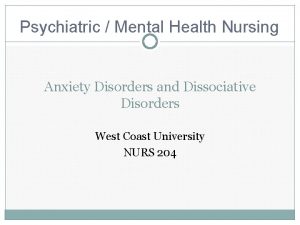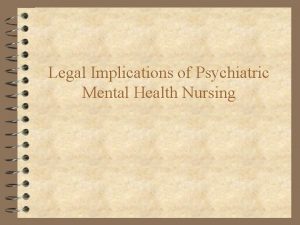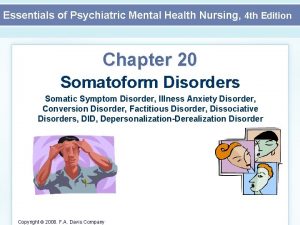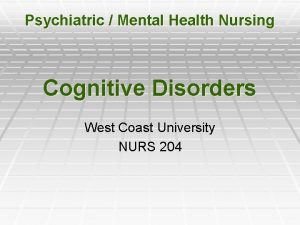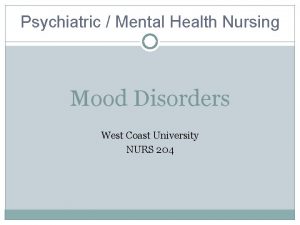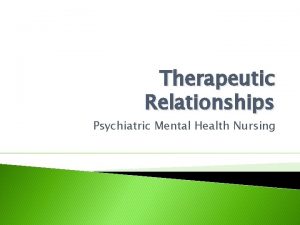Orientation and Foundations of Psychiatric Mental Health Nursing































- Slides: 31

Orientation and Foundations of Psychiatric Mental Health Nursing

Definition of Psychiatric Mental Health Nursing: n. A specialty within the nursing profession that focuses primarily on the use of therapeutic interpersonal interactions and biologic and interpersonal interventions with clients. n PMHN focuses on human aspects and responses to illness and is therefore part of all areas of nursing.

Four Core Mental Health Practice Areas: n Psychiatric nursing n Psychiatry n Psychology n Social work

Professional attributes of psychiatric nurses include: n Promotion of mental health n Prevention and treatment of mental disorders n Rehabilitation after the disorder

Principles of the Nurse-Client Relationship – The relationship is therapeutic rather than social – The focus remains on the client’s issues rather than on the nurse’s or other issues – The relationship is purposeful and goal directed – It is objective versus subjective in quality – It is time limited versus open ended

Therapeutic vs Social n. A – – – – therapeutic relationship is formed to help clients solve problems make decisions achieve growth learn coping strategies let go of unwanted behaviors reinforce self-worth examine relationships

Therapeutic vs Social n The meetings between nurse and client are not for mutual satisfaction. n The nurse can be friendly with the client, but is not there to be the client’s friend. n The majority of the interaction is focused and therapeutic.

Stages of the Nurse-Client Relationship n Pre-orientation phase n Orientation phase n Working phase n Termination phase

III. Mental Health and Mental Disorder

Defining and Classifying Mental Health and Mental Disorder n The ANA defines mental health as a state of well-being in which individuals function well in society and are generally satisfied with their lives. – Results in socially acceptable behavior and the ability to respond productively and appropriately in the environment

Defining and Classifying Mental Health and Mental Disorder n Mental disorder is a disturbance in an individual’s thinking, emotions, behaviors, and physiology. – Leads to problems with behavior, relationships, and functioning.

Mental Illness and Mental Health Continuum Mild joys, sorrows, and anxiety levels that aid in the work of living n Mild-Moderate psychophysiologic factors affecting medical conditions n Moderate-Severe anxiety d/os, dissociative d/os, somatoform d/os, personality d/os, and eating d/os n Severe-Psychosis depressive d/os, bipolar d/os, schizophrenic d/os, and cognitive d/os n

DSM 5 n n n A multiaxial classification scheme that allows for the interrelation of biological, psychological, and social aspects of an individual’s condition. Axis I – the psychiatric diagnosis Axis II – personality disorders and mental retardation Axis III – general medical conditions Axis IV – psychosocial and environmental problems Axis V – GAF- rates the overall psychological functioning of the client on a scale of 0 -100.

Mental illness n The American Psychiatric Association (APA, 2000) defines a mental disorder as “a clinically significant behavioral or psychological syndrome or pattern that occurs in an individual and that is associated with present distress (e. g. , a painful symptom) or disability (i. e. , impairment in one or more important areas of functioning) or with a significantly increased risk of suffering death, pain, disability, or an important loss of freedom”.

Factors contributing to mental illness n Individual factors include biologic makeup, anxiety, worries and fears, a sense of disharmony in life, and a loss of meaning in one’s life. n Interpersonal factors include ineffective communication, excessive dependency or withdrawal from relationships, and loss of emotional control. n Social and cultural factors include lack of resources, violence, homelessness, poverty, and discrimination such as racism, classism, ageism, and sexism.

Misconceptions about Mental Illness n Abnormal behavior is different or odd, and easily recognized. n Abnormal behavior can be predicted and evaluated. n Internal forces are responsible for abnormal behavior. n People who exhibit abnormal behavior are dangerous. n Maladaptive behavior is always inherited. n Mental illness is incurable

MENTAL HEALTH CARE

Understanding mental health and illhealth n No single, universal definition of mental health exists n Mental health is a positive state of being in its own right and is much more than the absence of a diagnosis of mental illness n When mentally well we have awareness of, and control over, different strands of our life. We have the will to live life to its full potential and things make sense to us.

Mental health vs. mental illness n People who can carry out their roles in society and whose behavior is appropriate and adaptive are viewed as healthy. Conversely those who fail to fulfill roles and carry out responsibilities or whose behavior is inappropriate are viewed as ill. n

Key messages from the WHO on promoting mental health n There is no health without mental health n Mental health is more than the absence of mental illness: it is vital to concepts, emerging evidence, practice n Mental health determined by socioeconomic and environmental factors n Mental health is linked to behavior n Mental health can be enhanced by effective public health interventions

Cont…Key messages from the WHO on promoting mental health n Collective actions depends on shared values as much as the quality of scientific evidence n A climate that respects and protects basic civil, economic, social, and cultural rights is fundamental to the promotion of mental health n Inter-sectorial linkage is the key for mental health promotion n Mental health is every body's business

Key concepts. . Mentally healthy person: is able to deal with normal human emotions, is productive, has successful relationships with others, can adapt to change, and can cope with adversity. n Mental illness: is a term used to mean all diagnosable mental disorders. n Mental disorders: are health conditions that are characterized by alteration in thinking, mood, or behavior and are associated with distress or impaired functioning. n Mental health problems: Is a term used when signs and symptoms of mental illness occur but do not meet specified criteria for a disorder. These problems cause distress to the person, who feels as if a mental disorder is present. These usually occur in stressful periods in a person’s life. n

Definition Mental health is a state of emotional, psychological, and social wellness evidenced by satisfying interpersonal relationships, effective behavior and coping, positive self-concept, and emotional stability. (Mohr, 2003)

components, and influential factors n Autonomy and independence n Maximization of one’s potential n Tolerance of life’s uncertainties n Self-esteem n Mastery of the environment n Reality orientation n Stress management

IX. Roles of the Mental Health Team

Roles of the Mental Health Team n Psychiatric Nurse – Has the most widely focused position description of any of the member roles – Interacts with clients in individual and group settings – Manages client care – Administers and monitors meds – Teaches both clients and families – Acts as a client advocate

Roles of the Mental Health Team n Psychiatric Social Worker – Graduate level position – Work with clients on an individual basis – Conduct group therapy sessions – Act as liaisons with the community to place clients after discharge

Roles of the Mental Health Team n Psychiatrist – Licensed medical physician who specializes in psychiatry – Prescribe and monitor meds – Admit clients into acute care settings – Administer ECT – Conduct individual and family therapy

Roles of the Mental Health Team n Psychologist – Licensed individual with a doctoral degree in psychology – Assess and treat psychologic and psychosocial problems of individuals, families, or groups – Do not prescribe or administer medications – Administer psychometric tests that aid in the diagnosis of disorders

Roles of the Mental Health Team n Marriage, Family, Child Counselor – Licensed individuals who frequently work in private practice – Prepared to work with individuals, couples, families, and groups – Emphasize the interpersonal aspects of achieving and maintaining relationships

Roles of the Mental Health Team n Case managers – Facilitate the delivery individualized, coordinated care in cost-effective ways – Need to know the various types of hospitalization and outpatient care settings, the coverage offered by different payers, and the impact of state and federal legislation
 Calgary family assessment model
Calgary family assessment model Nursing care plan hallucinations
Nursing care plan hallucinations Nursing process in psychiatric nursing
Nursing process in psychiatric nursing Legal issues in psychiatric nursing
Legal issues in psychiatric nursing Mental health and mental illness chapter 20
Mental health and mental illness chapter 20 Mental health nursing define
Mental health nursing define First psychiatric nurse in india
First psychiatric nurse in india Chronic insomnia
Chronic insomnia Ethical issues in psychiatric nursing
Ethical issues in psychiatric nursing Mental health jeopardy questions
Mental health jeopardy questions Conclusion of community mental health nursing
Conclusion of community mental health nursing Geocentric and polycentric approach
Geocentric and polycentric approach Theoretical foundation of nursing chapter 1
Theoretical foundation of nursing chapter 1 Nursing orientation and retention
Nursing orientation and retention Mse psych
Mse psych Psychological disorders
Psychological disorders Cmc psychiatric hospital
Cmc psychiatric hospital Role of psychiatric nurse
Role of psychiatric nurse During a psychiatric emergency the emt should be able to
During a psychiatric emergency the emt should be able to Psychiatric security review board
Psychiatric security review board Psychiatric rehabilitation
Psychiatric rehabilitation American nurses association illinois
American nurses association illinois American psychiatric association annual meeting 2020
American psychiatric association annual meeting 2020 Nefsh
Nefsh Liberty hill academy
Liberty hill academy Southern psychiatric association
Southern psychiatric association Psychiatric emergency
Psychiatric emergency Psychiatric emergency
Psychiatric emergency Emergency nursing orientation
Emergency nursing orientation Chapter 3 lesson 3 expressing emotions in healthful ways
Chapter 3 lesson 3 expressing emotions in healthful ways Mental health and older adults
Mental health and older adults Law enforcement mental health and wellness act
Law enforcement mental health and wellness act
